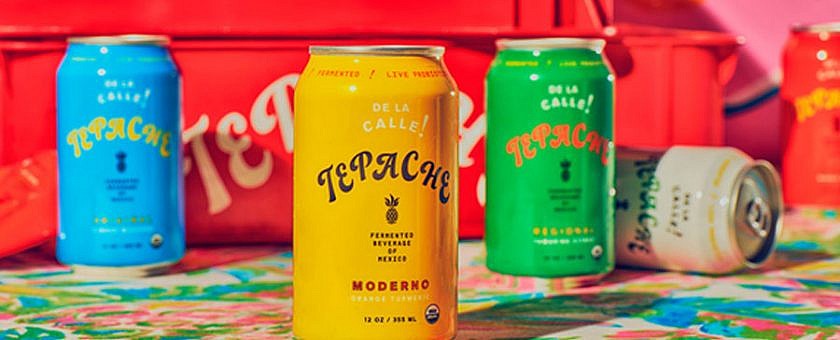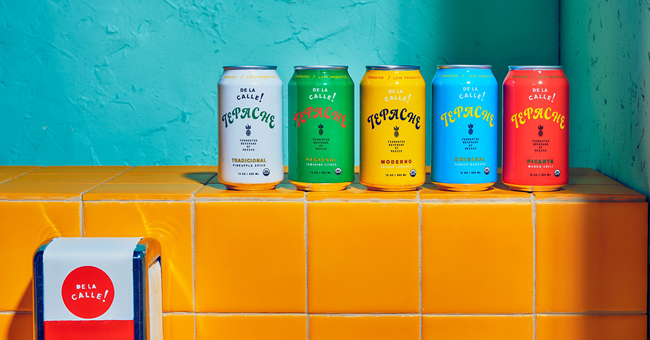
De La Calle Seeks to Build U.S. Tepache Market ‘From the Street’
- posted in: Investment
From: BevNET
By: Martín Caballero
While probiotic and prebiotic sodas are a relatively recent trend, Los Angeles-based branding and design agency Here Studio is aiming to introduce U.S. consumers to a similar drink with a few hundred years more of a track record. This month, the company is set to debut De La Calle (“from the street”), a line of traditional Mexican tepache fermented drinks in 12 oz. cans.
From aguas frescas to horchata to cane sugar-sweetened Coca-Cola, Mexico has a rich array of unique beverages to complement its famous and equally diverse street foods. Yet while those drinks have some level of awareness in the U.S., tepache, despite a centuries-old tradition in Mexico, is further behind. The non-alcoholic drink is traditionally prepared by adding water, sweeteners (turbinado sugar) and spices to a barrel of pineapple rinds and leaving it to ferment at room temperature for several days. Like other traditional Mexican refreshments, tepache has its own unique regional identities and preparation styles throughout the country.
Though familiar with the drink from seeing it during past visits to Mexico, Here Studio founder Alex Matthews admitted that the drink didn’t pique his interest until a conversation with Alan Karp. A friend and investor in Here Studio’s first brand, the sparkling apple cider vinegar drink Vina, Karp had been preparing his own brews at home, and inspired Matthews to try his hand at making it. Quickly taken by the taste, he and Karp quickly began exploring the potential for an authentic ready-to-drink version and assembling a team — including Nate Patena, managing partner at beverage development house Red Decimal — to make it a reality.

To understand the nature and spirit of the drink, Matthews, Karp and Patena spent a week traveling throughout Mexico getting to know tepache and trying dozens of different regional styles and recipes. Through Patena, the group connected with a family business that had been making tepache for generations and set the brand in motion.
“We were on the plane coming home and it just reinforced to me that this was a really special product with a real history, and we had someone who could make it for us in the most authentic way possible, whose family had been making it for generations,” Matthews said.
On the street in Mexico, tepache vendors will sell the drink in plastic bags tied off with a rubber band, but as a ready-to-drink product, the market is limited to Tapachito, a line from Mexican brand Frumex that is marketed as a “non-alcoholic pineapple cider” in glass bottles. In contrast, De La Calle plays up its identity as a “Mexican fermented beverage” on its label, with Matthews aiming for a design aesthetic that “if you picked it up in Mexico it wouldn’t be out of place.”
Flavor wise, the line reflects the different preparation methods and ingredients used in tepache. The flagship Tradicional highlights the pineapple flavors in the tapache (filtered water, turbinado sugar, pineapple and tepache cultures), plus agave, cinnamon extract, erythritol and the probiotic Bacillus Coagulans MTCC 5856. From that base of ingredients, each SKU adds new layers: Original features apple juice, ginger and black pepper; Regional adds fruit and herb notes from tamarind, rosemary, black pepper and orange juice; and Picante gets its fiery taste from chili, plus lime and mango. Each flavor contains a maximum of 40 calories and less than 10 grams of sugar per 12 oz. can.
De La Calle’s combination of unique flavor, better-for-you refreshment and gut-health support aligns with the callouts seen in another rising beverage category: probiotic and prebiotic sparkling drinks, such as Poppi, Olipop, Health Ade Booch-Pop and other products. At retail, De La Calle is set to cultivate a similar consumer base: the line will debut at Whole Foods stores in Southern California in February, followed by expansion into the Mid-Atlantic region. The brand has also secured its first national food service partner in Mexican restaurant chain Tocaya Organica, which operates 17 locations across California and Arizona. Customers can also order the product online at the brand’s website in single 12-packs ($46.99) or at a discounted price for a subscription.

While Matthews noted that the use occasion “is probably similar to or the same as kombucha,” tapache’s flavor profile and cultural heritage create a powerful point of differentiation.
“We are a tepache brand that is doing tapache,” he said. “We are only going to focus our attention on this, because that’s what the brand is, and we are passionate about being as authentic as possible.”
The launch of De La Calle also represents another piece of Matthews’ vision for Here Studio as a company that owns and operates its own suite of brands, in addition to its branding and design work with independents. As for Vina, Matthews said the brand has been steadily taking back lost ground after sales dipped during the early months of the COVID-19 pandemic last spring. The product is currently sold at natural retailers including Erehwon, Bristol Farms and Whole Foods stores in the SoCal and Rocky Mountain regions, though Matthews indicated that the brand was “maintaining a presence” while waiting for food service channels to return to normal.
